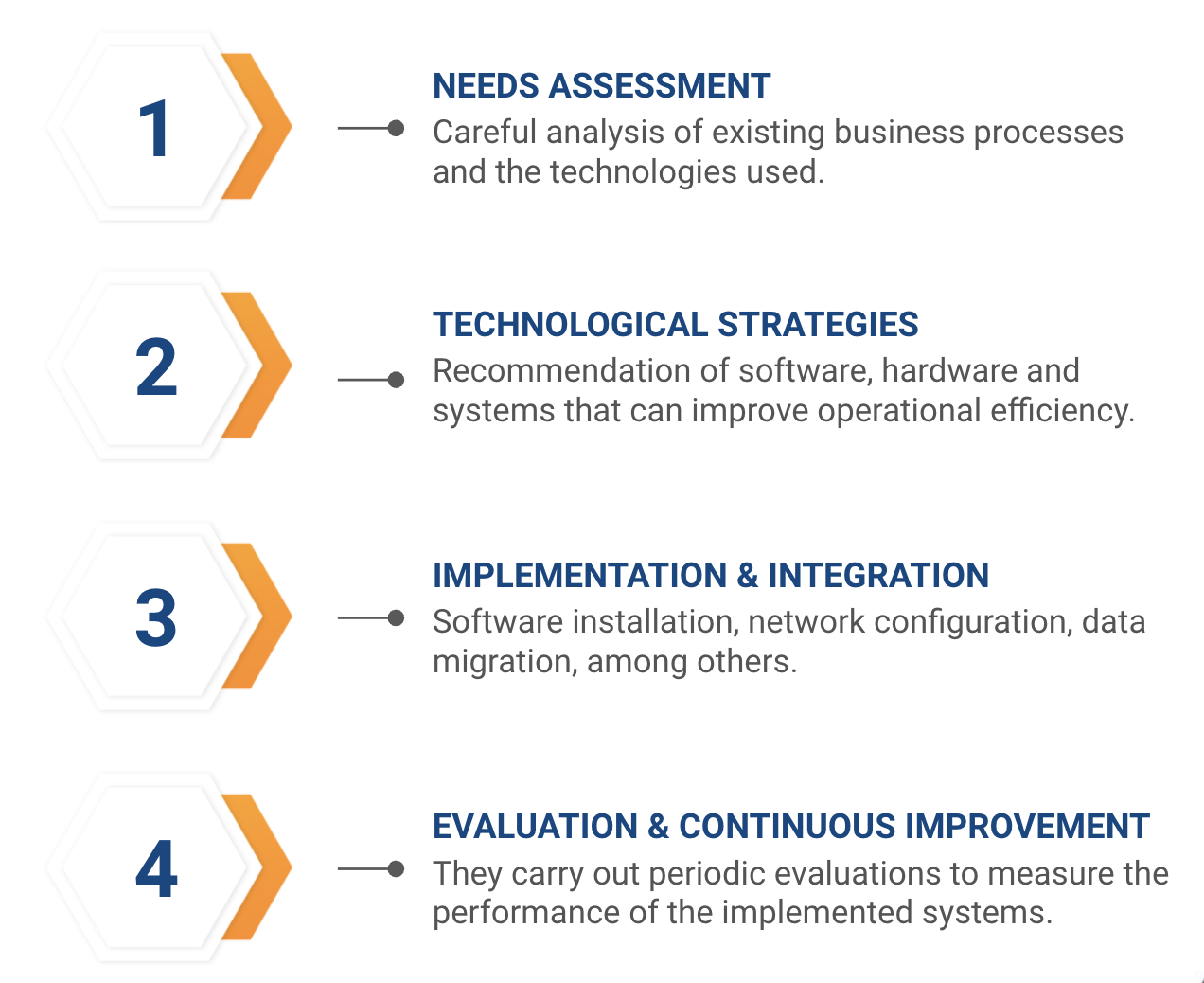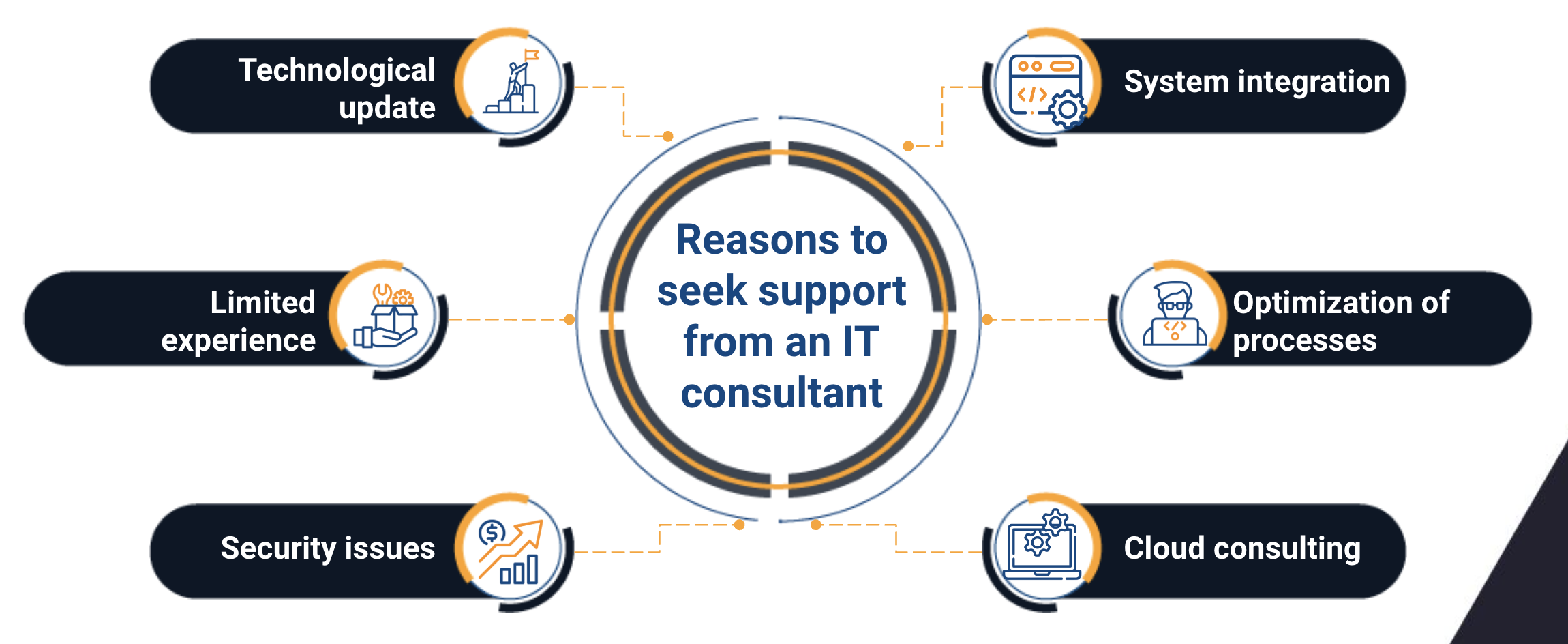
Responsibilities of an IT Consultant
October 06, 2023
Table of contents
Quick Access

In today's dynamic business world, companies are constantly immersed in projects that make the difference between success and stagnation. However, sometimes recognizing that they need help getting these projects on track can be a challenge in itself.
It is crucial to understand that asking for assistance is not a sign of weakness, but rather a sign of wisdom and vision. Smart business leaders recognize that external support can be the key to efficiently defining and achieving their objectives. This is where the IT consultant comes in, an expert who not only brings deep technical understanding, but also an objective perspective and varied experiences.
This professional not only assists in clearly defining project objectives, but also offers tailored strategies and customized solutions. By relying on an IT consultant, businesses benefit from expert guidance that not only clarifies the path but also ensures that every step is backed by solid knowledge, thus allowing projects to move smoothly towards success.
In this article, we want to delve deeper into the role an IT consultant plays in a project and what their responsibilities are once you hire them to evaluate your business processes.
These are the responsibilities of an IT consultant
1. Assessment of customer needs:
The first and most important step for an IT consultant is to understand the client's specific needs and goals. This involves conducting a careful analysis of existing business processes and the technologies used. A competent consultant dives into the client's organizational structure to identify areas of improvement and optimization opportunities.
“Your job is to evaluate information about your clients to establish growth plans and identify possible errors that affect the success of your clients”, they indicated in an Indeed article.

2. Development of technological strategies:
With a deep understanding of client needs, the IT consultant develops customized technology strategies. This includes recommending software, hardware and systems that can improve operational efficiency and provide a competitive advantage. Additionally, they must consider factors such as information security, scalability, and compatibility with existing systems.
3. Implementation and integration:
Once the technology strategies have been defined, the IT consultant oversees the implementation of solutions. This may involve installing software, configuring networks, migrating data, and making sure all systems are integrated smoothly. The ability to manage IT projects is essential, as it involves coordinating teams and resources to meet deadlines and budgets.
“They advise organizations on the process of integrating technology systems and programs to ensure they work together seamlessly. They oversee the entire process, from planning and configuration to installation, and also provide post-installation support and troubleshooting”, they noted in a Glassdoor article.

4. Training and support:
The introduction of new technologies often requires staff to adapt and acquire new skills. The IT consultant provides comprehensive training to ensure that employees can use the new tools effectively. Additionally, they offer ongoing support to resolve issues, update systems, and ensure uninterrupted business operations.
5. Evaluation and continuous improvement:
The work of an IT consultant does not end with the implementation of technological solutions. They carry out periodic evaluations to measure the performance of the implemented systems and propose continuous improvements. Technology is constantly evolving, and IT consultants must stay up to date with the latest trends and advancements to offer relevant and effective advice.
Situations in which a company seeks support from an IT consultant
Companies seek the support of IT consultants in a variety of situations to leverage their experience and specialized knowledge. Some of the common situations for which a company may require the help of an IT consultant include:
- Technological update
When a company wants to update its computer systems and adopt new technologies to improve efficiency and productivity.
“If you are trying to keep up with these new developments but feel like you are lost, it is a good idea to find a consultant who has knowledge of your industry and the latest developments related to it”, they noted in a Forbes publication.
- When your IT staff has limited experience in a new system
“Sometimes you have IT staff with little experience in a new system, software or program. If this is the case for your company, hiring an IT consultant can help you set up and use the technology correctly, and will provide you with expert advice on the best way to address specific technology-related issues”, they noted in this LinkedIn article.

- Security issues
In case of cybersecurity issues, such as data breaches or malware attacks, companies look to IT consultants to strengthen their security measures and protect sensitive information.
- System integration
When a company needs to integrate different systems and applications to ensure fluid communication and collaboration between departments and teams.
- Optimization of processes
If a company seeks to optimize its internal processes and reduce costs, an IT consultant can help identify areas of improvement and propose efficient technological solutions.

- Digital Strategy
To develop a comprehensive digital strategy encompassing online marketing, social media presence and website optimization to improve visibility and attract more customers.
- Cloud Consulting
When a company decides to migrate its operations to the cloud, an IT consultant can assist in the planning, implementation and management of cloud services to take advantage of the benefits of scalability and accessibility.
- Performance issues
When a company faces performance issues in its systems, such as slowness or frequent crashes, IT consultants can diagnose and fix these problems to improve operational efficiency.
IT consultants are hired to address a wide range of technological challenges and help businesses adapt and thrive in an increasingly digitalized business environment.
Do you need a form of IT consulting to advise you on your next project? At Rootstack, we have +12 years of experience supporting companies in their digital transformation. Contact us!
We recommend you this video
Related Blogs
-6.45.03-p.m.png)
Migrating to Oracle Cloud: Strategies and Considerations
-9.01.17-a.m.png)
Nearshore development helps midsize companies grow
-9.01.17-a.m.png)
Methodologies used by IT staff augmentation companies
-9.01.17-a.m.png)
Hire a software development team in Colombia
-2.10.50-p.m.png)
What you gain by hiring a software provider in Panama
-3.57.25-p.m.png)
